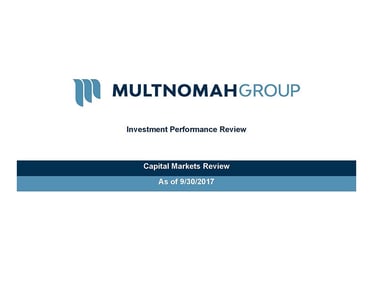 The U.S. economy grew at an annualized rate of 3.1% in the most recent quarter, recording its quickest pace in more than two years. Momentum will likely slow in the upcoming quarter as Hurricanes Harvey and Irma temporarily curbed activity. The current economic expansion is in its 9th year, the 3rd longest expansion since the Civil War. Core CPI, which strips out food and energy prices, remained unchanged at 1.7% in August; this is substantially below its 50-year average of 4.1%.
The U.S. economy grew at an annualized rate of 3.1% in the most recent quarter, recording its quickest pace in more than two years. Momentum will likely slow in the upcoming quarter as Hurricanes Harvey and Irma temporarily curbed activity. The current economic expansion is in its 9th year, the 3rd longest expansion since the Civil War. Core CPI, which strips out food and energy prices, remained unchanged at 1.7% in August; this is substantially below its 50-year average of 4.1%.
The unemployment rate is at a 16-year low of 4.2%. Average hourly wages have grown 2.9% over the past 12 months. The effects of the active hurricane season were partly responsible for wage pressure since low wage industries like leisure and hospitality recorded large job losses in September, temporarily boosting average wages. In September, 33,000 jobs were lost. This is the first monthly drop in payrolls in seven years.
U.S. factory activity hit a 13-year high in September given strong gains in new orders and raw material prices. Service sector activity is at a 12-year high. Consumer spending, which makes up over two-thirds of the U.S. economy, grew 3.3% in the most recent quarter, the fastest in a year.
The Federal Reserve plans to reduce its bond holdings at a measured pace over the course of several years. This follows the expansion of its balance sheet from under $1 trillion to over $4 trillion as the Fed initiated quantitative easing to support the markets after the Financial Crisis of 2008. The Fed has never unwound such a large amount of assets before. The last interest rate hike was in June, the 4th increase since December 2015. At quarter end, the 10- and 30-year Treasury bond yields increased modestly to 2.3% and 2.9%. Treasury bond yields moved up following the recent unemployment report that hinted at possible signs of inflation. The Bloomberg Barclays U.S. Aggregate Index inched up 0.85% during the quarter. Developed international and emerging market bonds returned 2.5% and 2.4%, respectively. High yield bonds reported strong returns at 1.8% as yields decreased modestly to 5.5%.
The U.S. stock market continued to climb higher despite political and geopolitical risks. The S&P 500 gaining 4.5% during the third quarter, returning 14.2% for year-to-date. The largest sector gains in the S&P 500 for the quarter were technology and energy, increasing 8.7% and 6.8%, respectively. The consumer staples sector was the only sector to decline, down 1.4%. The forward P/E for the S&P 500 inched up to 17.7x, versus a 25-year average of 16.0x. Small cap stocks outperformed large caps during the quarter, a reversal from the prior quarter. Growth stocks outperformed value stocks for the period. The CBOE Volatility Index (VIX Index) remained low, potentially setting the market up for disappointment. The emerging markets sector continued to rally, gaining 8.0% in the quarter helped by Latin America (up 15.1%) and Emerging Asia (up 7.2%). China was the strongest market in Emerging Asia increasing 14.7%, with a year-to-date gain of 43.2%. Developed Europe (ex-UK) gained 7.0% while the UK gained 5.2%. Market strength across these regions can be partly explained by the synchronized global recovery as nearly all major markets are experiencing positive growth in real economic activity.
The Bloomberg Commodity Index improved modestly for the quarter gaining 2.3%, yet it remained the worst performing asset class for year-to-date. U.S. crude oil prices jumped 12.3%, finishing at $51.67 per barrel. Despite the rebound, oil prices remained down 3.8% for year-to-date. Gold prices increased 3.4% to $1,284 per troy ounce. REITs gained 0.6% for the quarter and 6.0% for year-to-date. Net operating income for U.S. real estate grew 5.2% for the most recent quarter available. While real estate fundamentals remain strong, the cycle appears to be in the latter stages of its recovery.
To view Multnomah Group's full Capital Markets Review, please click here.
Multnomah Group is a registered investment adviser, registered with the Securities and Exchange Commission. Any information contained herein or on Multnomah Group’s website is provided for educational purposes only and does not intend to make an offer or solicitation for the sale or purchase of any specific securities, investments, or investment strategies. Investments involve risk and, unless otherwise stated, are not guaranteed. Multnomah Group does not provide legal or tax advice.
Any views expressed herein are those of the author(s) and not necessarily those of Multnomah Group or Multnomah Group’s clients.

